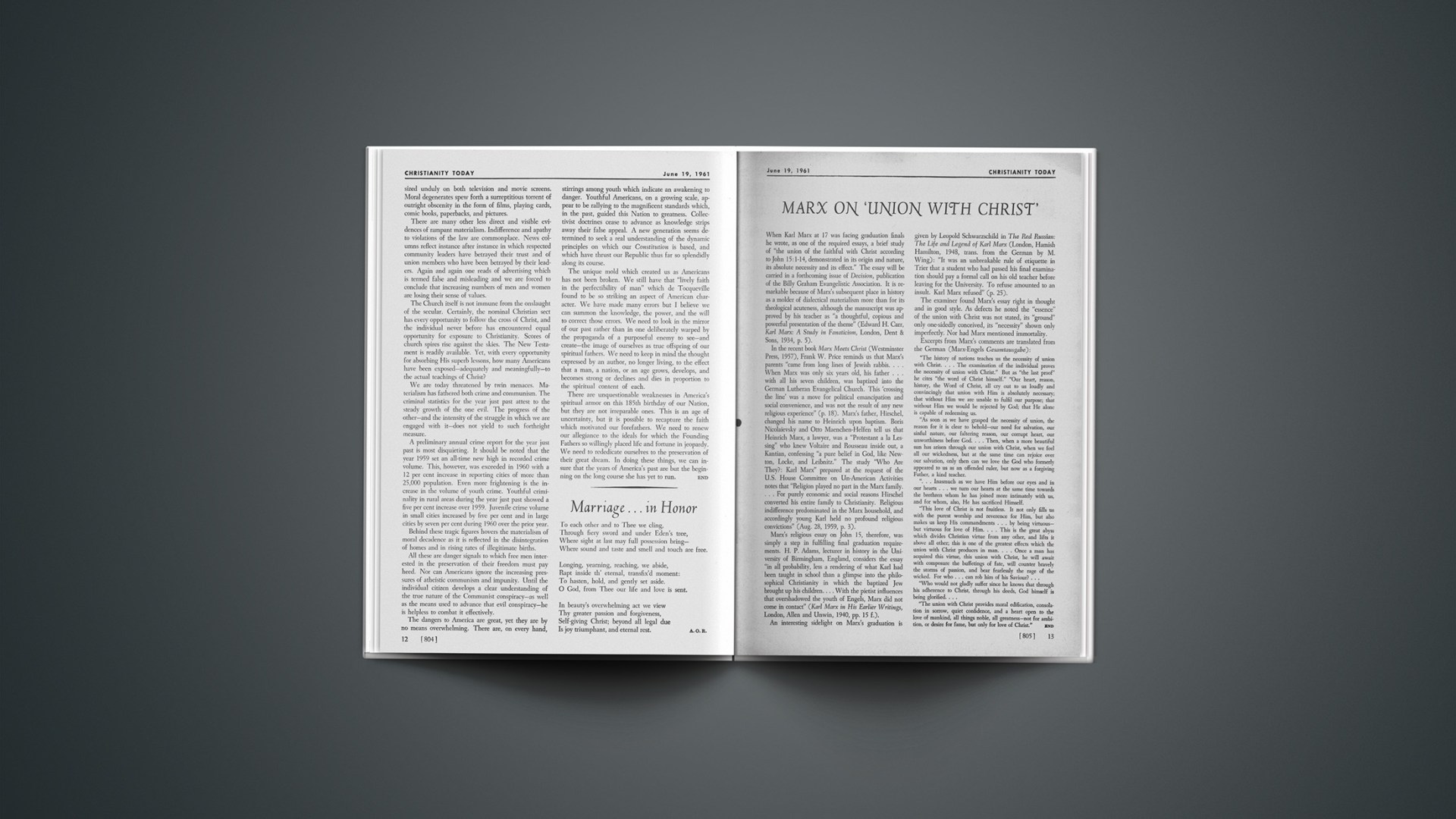When Karl Marx at 17 was facing graduation finals he wrote, as one of the required essays, a brief study of “the union of the faithful with Christ according to John 15:1–14, demonstrated in its origin and nature, its absolute necessity and its effect.” The essay will be carried in a forthcoming issue of Decision, publication of the Billy Graham Evangelistic Association. It is remarkable because of Marx’s subsequent place in history as a molder of dialectical materialism more than for its theological acuteness, although the manuscript was approved by his teacher as “a thoughtful, copious and powerful presentation of the theme” (Edward H. Carr, Karl Marx: A Study in Fanaticism, London, Dent & Sons, 1934, p. 5).
In the recent book Marx Meets Christ (Westminster Press, 1957), Frank W. Price reminds us that Marx’s parents “came from long lines of Jewish rabbis.… When Marx was only six years old, his father … with all his seven children, was baptized into the German Lutheran Evangelical Church. This ‘crossing the line’ was a move for political emancipation and social convenience, and was not the result of any new religious experience” (p. 18). Marx’s father, Hirschel, changed his name to Heinrich upon baptism. Boris Nicolaievsky and Otto Maenchen-Helfen tell us that Heinrich Marx, a lawyer, was a “Protestant a la Lessing” who knew Voltaire and Rousseau inside out, a Kantian, confessing “a pure belief in God, like Newton, Locke, and Leibnitz.” The study “Who Are They?: Karl Marx” prepared at the request of the U.S. House Committee on Un-American Activities notes that “Religion played no part in the Marx family.… For purely economic and social reasons Hirschel converted his entire family to Christianity. Religious indifference predominated in the Marx household, and accordingly young Karl held no profound religious convictions” (Aug. 28, 1959, p. 3).
Marx’s religious essay on John 15, therefore, was simply a step in fulfilling final graduation requirements. H. P. Adams, lecturer in history in the University of Birmingham, England, considers the essay “in all probability, less a rendering of what Karl had been taught in school than a glimpse into the philosophical Christianity in which the baptized Jew brought up his children.… With the pietist influences that overshadowed the youth of Engels, Marx did not come in contact” (Karl Marx in His Earlier Writings, London, Allen and Unwin, 1940, pp. 15 f.).
An interesting sidelight on Marx’s graduation is given by Leopold Schwarzschild in The Red Russian: The Life and Legend of Karl Marx (London, Hamish Hamilton, 1948, trans. from the German by M. Wing): “It was an unbreakable rule of etiquette in Trier that a student who had passed his final examination should pay a formal call on his old teacher before leaving for the University. To refuse amounted to an insult. Karl Marx refused” (p. 25).
The examiner found Marx’s essay right in thought and in good style. As defects he noted the “essence” of the union with Christ was not stated, its “ground” only one-sidedly conceived, its “necessity” shown only imperfectly. Nor had Marx mentioned immortality.
Excerpts from Marx’s comments are translated from the German (Marx-Engels Gesamtausgabe):
“The history of nations teaches us the necessity of union with Christ.… The examination of the individual proves the necessity of union with Christ.” But as “the last proof” he cites “the word of Christ himself.” “Our heart, reason, history, the Word of Christ, all cry out to us loudly and convincingly that union with Him is absolutely necessary; that without Him we are unable to fulfil our purpose; that without Him we would be rejected by God; that He alone is capable of redeeming us.
“As soon as we have grasped the necessity of union, the reason for it is clear to behold—our need for salvation, our sinful nature, our faltering reason, our corrupt heart, our unworthiness before God.… Then, when a more beautiful sun has arisen through our union with Christ, when we feel all our wickedness, but at the same time can rejoice over our salvation, only then can we love the God who formerly appeared to us as an offended ruler, but now as a forgiving Father, a kind teacher.
“… Inasmuch as we have Him before our eyes and in our hearts … we turn our hearts at the same time towards the brethren whom he has joined more intimately with us, and for whom, also, He has sacrificed Himself.
“This love of Christ is not fruitless. It not only fills us with the purest worship and reverence for Him, but also makes us keep His commandments … by being virtuous—but virtuous for love of Him.… This is the great abyss which divides Christian virtue from any other, and lifts it above all other; this is one of the greatest effects which the union with Christ produces in man.… Once a man has acquired this virtue, this union with Christ, he will await with composure the bufferings of fate, will counter bravely the storms of passion, and bear fearlessly the rage of the wicked. For who … can rob him of his Saviour?…
“Who would not gladly suffer since he knows that through his adherence to Christ, through his deeds, God himself is being glorified.…
“The union with Christ provides moral edification, consolation in sorrow, quiet confidence, and a heart open to the love of mankind, all things noble, all greatness—not for ambition, or desire for fame, but only for love of Christ.”










